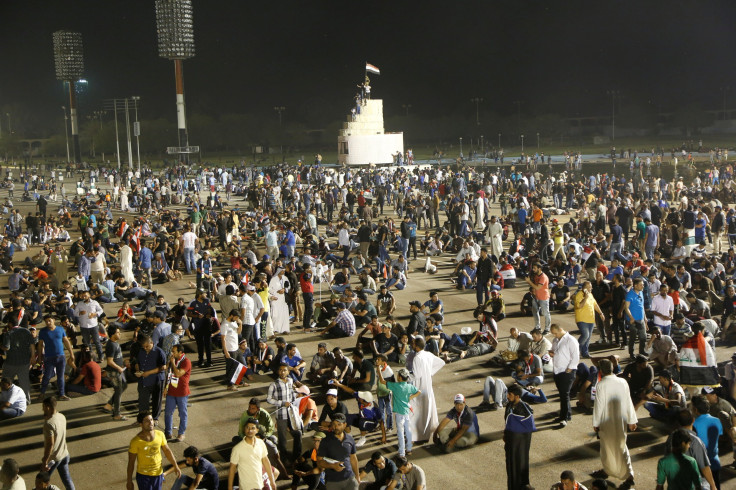Iraq Protests Update: Supporters Of Iraqi Shiite Cleric Camp Outside Parliament, PM Calls For Rioters To Be Punished

Supporters of the outspoken Shiite cleric Muqtada al-Sadr gathered inside Baghdad's Green Zone Sunday, a day after they stormed Iraq's parliament. The protests — demanding a vote on overhauling the government amid growing anger over corruption — continued as Iraq's prime minister reportedly called for rioters to be pursued and punished.
Demonstrators pulled down slabs of heavy blast concrete wall to enter the secure Green Zone, home to embassies and government buildings, following weeks of political turmoil and inaction by Iraq's Parliament. According to reports, the situation was calm on Sunday compared to violent protests Saturday that forced police to fire tear gas at demonstrators, close streets into Baghdad, and declare a state of emergency in the capital.
"Either corrupt (officials) and quotas remain or the entire government will be brought down and no one will be exempted," Sadr said in a televised address shortly before parliament was stormed Saturday, according to BBC.
On Sunday, protesters camped outside the parliament, while Prime Minister Haider al-Abadi's office said that necessary actions must be taken against people involved in attacks or vandalism.
Abadi "directed the interior minister to pursue the elements who attacked the security forces and citizens and members of parliament and vandalized state properties and to refer them to the judiciary to receive their just punishment," a statement from his office said.
Sadr called for the demonstrations in a bid to pressure Abadi to move ahead with reforms he had promised, including replacing current ministers with unaffiliated technocrats. As pressure mounted, the Parliament approved a partial reshuffle earlier in the week. Tensions escalated Saturday after news broke that a vote to further change the Parliament had been postponed until next week.
Abadi, who came to power in 2014, vowed to end corruption and ease tensions with the Sunni Muslim minority.
The country's government has been slow to deliver reforms promised last year, as it has been focused on the fight against the Islamic State group, also known as ISIS. U.S. and Iraqi officials have expressed concern that instability in Baghdad could hamper the fight against ISIS, which now controls large swaths of the country, along with vast portions in neighboring Syria.
© Copyright IBTimes 2024. All rights reserved.











